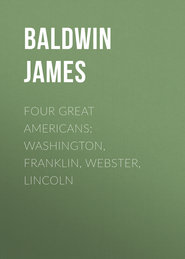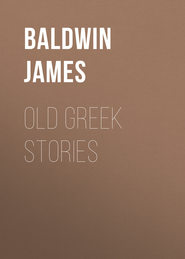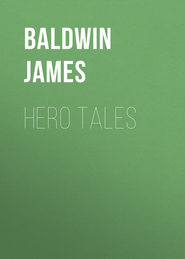По всем вопросам обращайтесь на: info@litportal.ru
(©) 2003-2024.
✖
A Story of the Golden Age
Настройки чтения
Размер шрифта
Высота строк
Поля
"My father Eurytus, as I have said, was the king of archers; for no man could draw an arrow with so unerring aim as he, and no man could send it straight to the mark with a more deadly force. Every thought of his waking hours was upon his bow, and he aspired to excel even the archery of Artemis and Apollo. At length he sent a challenge into every city of Hellas: 'Whosoever will excel Eurytus in shooting with the bow and arrows, let him come to Œchalia, and try his skill. The prize to be given to him who succeeds is Iole, the fair daughter of Eurytus.'
"Then there came to the contest, great numbers of young men, the pride of Hellas. But when they saw this wonderful bow of Eurytus, and tried its strength, their hearts sank within them; and when they aimed their shafts at the target, they shot far wide of the mark, and my father sent them home ashamed and without the prize.
"'My dearest Iole,' he would often say, 'I am not afraid of losing you, for there lives no man who knows the bow as well as I.'
"But by and by great Heracles heard of my father's boasts, and of the prize which he had offered.
"'I will go down to Œchalia,' said he, 'and I will win the fair Iole for my bride.'
"And when he came, my father remembered how he had taught him archery in his youth; and he felt that in his old pupil he had at last found a peer. Yet he would not cease his boasting. 'If the silver-bowed Apollo should come to try his skill, I would not fear to contend even with him.'
"Then the target was set up, so far away that it seemed as if one might as well shoot at the sun.
"'Now, my good bow,' said my father, 'thou hast never failed me: do thou serve me better to-day than ever before!'
"He drew the strong cord back, bending the bow to its utmost tension; and then the swift arrow leaped from its place, and sped like a beam of light straight towards the mark. But, before it reached its goal, the strength which my father's arm had imparted to it began to fail; it wavered in the air, its point turned downward, and it struck the ground at the foot of the target.
"Then Heracles took up his bow, and carelessly aimed a shaft at the distant mark. Like the lightning which Zeus hurls from the high clouds straight down upon the head of some lordly oak, so flashed the unfailing arrow through the intervening space, piercing the very centre of the target.
"'Lo, now, Eurytus, my old-time friend,' said Heracles, 'thou seest that I have won the victory over thee. Where now is the prize, even the lovely Iole, that was promised to him who could shoot better than thou?'
"But my father's heart sank within him, and shame and grief took mighty hold of him. And he sent Iole away in a swift-sailing ship, to the farther shores of the sea, and would not give her to Heracles as he had promised. Then the great hero turned him about in anger, and went back to his home in Calydon, threatening vengeance upon the house of Eurytus. I besought my father that he would remember his word, and would call Iole home again, and would send her to Heracles to be his bride. But he would not hearken, for the great sorrow which weighed upon him. He placed his matchless bow in my hands, and bade me keep it until I should find a young hero worthy to bear it.
"'It has served me well,' he said, 'but I shall never need it more.' Then he bowed his head upon his hands, and when I looked again the life had gone from him. Some men say that Apollo, to punish him for his boasting, slew him with one of his silent arrows; others say that Heracles smote him because he refused to give to the victor the promised prize, even fair Iole, the idol of his heart. But I know that it was grief and shame, and neither Apollo nor Heracles, that brought death upon him.
"As to Heracles, he dwelt a long time in Calydon, where he wooed and won the princess Deianeira, the daughter of old Oineus; but the memory of Iole, as she had been to him in the bright days of his youth, was never blotted from his mind. And the people of Calydon loved him, because, with all his greatness and his strength, he was the friend and helper of the weak and needy. But one day, at a feast, he killed by accident a little boy in the palace of Oineus, named Eunomos; and his heart was filled with grief, and he took his wife Deianeira, and, leaving Calydon, he journeyed aimlessly about until he came to Trachis in Thessaly. There he built him a home, but his restless spirit would give him no peace; and so, leaving Deianeira in Trachis, he came back towards Argolis by way of the sea. Three moons ago, I met him in Tiryns. He greeted me as a dear old friend, and kindly offered to help me in the undertaking which I had then on foot; for robbers had driven from my pastures twelve brood mares, the finest in all Hellas, and I was searching for them.
"'Go you with your men into Messene,' said he, 'for doubtless you will find that which you seek among the lawless men who own Orsilochus as king. If you find them not, come again to Tiryns, and I will aid you in further search, and will have them restored to you, even though Hermes, or great Autolycus, be the thief.'
"So I left him, and came hither to Messene, and to the high-walled towers of Pherae; and thus you know my errand which I have kept hidden from Orsilochus. I have found no traces of the stolen mares; and so to-morrow I shall return to Argolis and Tiryns where the great hero waits for me."
Much more would godlike Iphitus have spoken; but now the sun had set, and the two friends hastened back to the palace of Orsilochus.
"Never have I met a man whose friendship I prized more highly than thine," said Odysseus, as they crossed the courtyard, and each was about to retire to his chamber. "I pray that thou wilt take this sharp sword, which was my father's, and this mighty spear, as tokens of the beginnings of a loving friendship." And the young man put the noble weapons into the old hero's hands.
"And do thou take in return an equal present," said Iphitus. "Here is the matchless bow of Eurytus my father; it shall be thine, and shall be to thee a worthy token of the love which I bear towards thee."
Odysseus took the bow. It was a bow of marvellous beauty, and its strength was so great that no man, save its proud new owner, could string it. It was indeed a matchless gift, and a treasure to be prized.
ADVENTURE XII.
THE MOST BEAUTIFUL WOMAN IN THE WORLD
Very early on the following day, Iphitus bade Orsilochus farewell, and started on his journey back towards Tiryns; and Odysseus, to the surprise of all, went with him, riding in the same chariot.
"I know that you want to go into Laconia," Iphitus had said. "Why not go now? For I and my brave men will convoy you safely as far as Lacedæmon; and when there, I will commend you to my old comrades, Castor and Polydeuces, who dwell in the palace of their father, King Tyndareus."
And Odysseus had gladly consented; for, although his host had pressed him hard to stay longer, he was very anxious for many reasons to visit Lacedæmon.
For two days the company travelled slowly eastward. They crossed the mountain land which lies between Messene and Laconia, and came to the plain, rich with wheat-fields, which lay beyond. And now the way was easier, and the road led straight towards Lacedæmon.
At noon on the second day, they rested upon the banks of a little stream; and, as the sun was hot, they sat a long time in the pleasant shade of some trees which grew not far from the roadside. Some distance down the valley they caught glimpses of the high towers of the city; and now and then they heard the sound of busy workers within the walls, or the shouts of the toilers in the neighboring fields. A ride of only a few minutes would bring them to the gates of Lacedæmon. While they were thus waiting and resting, an old minstrel, who had come out of the city, joined them by the roadside, and began to entertain them. At first he played sweetly upon his lyre, and sang songs, new and old, which he thought would be pleasing to his listeners. Then he told them stories of the times, now long past, when yet men lived in peaceful innocence, unbeset with eating cares.
"And now," he said, "since you are about to enter Lacedæmon, and will spend the night within the kingly halls of great Tyndareus, you must needs hear of the beauty and the courage and the wealth for which this city is far famed among all the states of Hellas. The riches of which we boast cannot be measured like gold and precious stones; our wealth lies in the courage and true-heartedness of our men, and in the beauty and devotedness of our women."
And then he told them of the four wonderful children whom King Tyndareus and his wife Leda had reared in the pleasant halls of Lacedæmon, – Castor and Polydeuces, the devoted brothers; and the sisters, proud Clytemnestra, and Helen the beautiful. He told how Castor and Polydeuces were famed among all the heroes of Greece; how they had sailed with Jason on the Argo; how they had hunted the wild boar in the woods of Calydon; and how they had fought under the banner of Peleus when he stormed the town of Iolcos, and drove the false Acastus from his kingdom. He told how Helen, while yet a mere child, had been stolen from her home and her parents, and carried by Theseus of Athens to far-distant Attica; and how her brothers Castor and Polydeuces had rescued her, and brought her back to her loving friends in Lacedæmon. He told how the two brothers excelled in all the arts of war, and in feats of courage and skill; how Castor was renowned at home and abroad as a tamer of horses, and how Polydeuces was without a peer as a boxer and as a skilful wielder of the sword. And he told how the beauty of Helen had brought hosts of suitors from every quarter of the world; and how her father, old Tyndareus, was all the time beset with courtiers, princes, and heroes, the noblest of the earth, – all beseeching him for the hand of the matchless fair one.
No one knows how long the old man would have kept on talking, had not Iphitus bade him cease. "We have heard already, a thousand times, the tales that you tell us," he said. "Waste no more time with vain words which are on the tongue of every news-monger in Argolis; but make haste back to the city, and say to Castor and Polydeuces that Iphitus, who erstwhile was their comrade on the Argo, waits outside the gates of Lacedæmon."
The minstrel bowed, and said, "It is not for me to act the part of a herald for a stranger. But do you send one of your young men into the city, and I will gladly go with him into the broad palace of the king, where he may announce your coming."
Then Iphitus called to one of the young men in his company, and bade him go before them to the palace, to herald their coming; and the old minstrel went with him.
Now when the sun was beginning to sink behind the heights of lofty Taygetes, the company arose from their resting-place by the roadside, and began to move slowly towards the city. At the same time, two horsemen came out through the gate, and rode rapidly up the valley to meet them. Iphitus waved his long-plumed helmet in the air, and shouted aloud. "There they come," he cried, – "the twin heroes! as noble and as handsome, and seemingly as young, as when we sailed together on the Argo."
It seemed but a moment until the horsemen approached and drew rein before them. They were tall and comely youths, exceedingly fair, and so alike that no man could tell which one was Castor or which Polydeuces. Their armor was of gold, and glowed in the light of the setting sun like watch-fires on the mountain-tops. Their steeds were white as snow, with long manes that glimmered and shone like the silvery beams of the moon on a still summer's evening.
"All hail, our old-time comrade!" they cried. "Welcome to the halls of Lacedæmon! We bid you welcome in the name of our aged father, King Tyndareus."
Then they turned, and led the way to the lofty palace gates.
As Odysseus and his aged friend dismounted from their car, a score of ready squires came out to serve them. Some loosed the horses from the yoke, and led them to the stables, and fed them plentifully with oats and white-barley grains; others tilted the car against the wall of the outer court, so that no careless passer-by would run against or injure it; and still others carried the arms of the heroes into the spacious hall, and leaned them with care against the grooved columns.
Then Castor and Polydeuces, the glorious twins, led the heroes into the broad hall of King Tyndareus. Odysseus gazed about him with wondering eyes, for he had never seen so great magnificence. Walls of polished marble ran this way and that from the brazen threshold; the doors were of carved oak inlaid with gold, and the door-posts were of shining silver. Within were seats and sumptuous couches ranged against the wall, from the entrance even to the inner chambers; and upon them were spread light coverings, woven and embroidered by the deft hands of women. And so great was the sheen of brass, of gold and silver, and of precious gems, within this hall, that the light gleamed from floor to ceiling, like the beams of the sun or the round full moon.[16 - See Note 12 (#note_12) at the end of this volume.]
The aged king was pleased to see the heroes; for Iphitus and he had been lifelong friends, firm and true, through every turn of fortune. And when he learned the name and parentage of young Odysseus, he took him by the hand, and bade him welcome for the sake of his father, good Laertes.
The first words of greeting having been spoken, Odysseus, still wondering, went down into the polished baths. There, when he had bathed, he clothed himself in princely garments; and he threw a soft, rich cloak about his shoulders, and made himself ready to stand in the presence of beauty, nobility, and courage. Then Polydeuces led him back into the great hall.
But a change had taken place while he was gone. The king was no longer alone. There stood around him, or sat upon couches, all the noblest young heroes of Hellas. The king's son-in-law, tall Agamemnon of Mycenæ, stood behind the throne; and near him was his handsome brother Menelaus. Among all the princes then at Lacedæmon, these two sons of Atreus were accounted worthiest; for not only did they excel in strength and wisdom, but they were heirs to the kingdom of Argolis, and the lordship over men. Next to them stood Ajax the son of Telamon; he was nephew to old King Peleus, who had wedded the sea-nymph in the cave-halls of Mount Pelion; and among the younger heroes there was none who equalled him in bravery.
Reclining on a couch at the king's left hand was another prince of the same name, – Ajax, the son of Oileus. He had come from distant Locris, where he was noted as the swiftest runner and the most skilful spearsman in all Hellas. He was neither so tall nor so handsome as the son of Telamon; but the very glance of his eye and the curl of his lip, made men admire and love him.
Below him stood Diomede of Tiryns, who, though still a mere youth, was a very lion in war. His father, brave Tydeus, had met his death while fighting with the Thebans; but he had long ago avenged him.
Idomeneus, a prince of Crete, known far and wide for his skill in wielding the spear, was next, a man already past the prime of life. And beyond him in order were other princes: Philoctetes of Melibœa, famous for his archery; Machaon, son of Asclepius, from Œchalia, the home of Iphitus; Antilochus of Pylos, late the companion of Odysseus; Nireus of Syma, famed only for his comeliness; and Menestheus of Athens, who, in the management of men and horses and the ordering of battle, had not a peer on earth.
All these were in the hall of King Tyndareus; and they received Odysseus with words of seeming kindness, although a shade of jealousy was plainly seen upon their faces. While they were speaking, a minstrel entered, and began to play deftly upon his lyre; and, as he played and sung, two dancers sprang upon the floor, and whirled in giddy mazes about the hall. Then from their high-roofed chamber, where the air was full of sweet perfumes, came three women to listen to the music. Helen, like in form to Artemis the huntress-queen, led the rest; and when Odysseus saw her, he remembered no more the golden splendor which had dazzled his eyes when first he stood upon the threshold of the palace, for every thing else paled in the light of Helen's unspeakable beauty. Next to her came Clytemnestra, who, a few years before, had been wedded to Agamemnon of Mycenæ. She was fair, but not beautiful; and the glance which fell from her eye sent a thrill of pain to the heart of the young hero. The two sisters were followed by their cousin, sweet Penelope, who, blushing like the morning, kept her eyes modestly upon the ground, and looked not once towards the company of princely strangers. And, as she stood leaning against a lofty column, Odysseus wondered within himself whether he admired more the glorious beauty of Helen, or the retiring sweetness of Penelope.
ADVENTURE XIII.
A RACE FOR A WIFE
Days and weeks passed by, and still Odysseus tarried as a guest at the court of King Tyndareus. His friend Iphitus had gone on to Tiryns to meet the hero Heracles, and had left with him his blessing and the bow of Eurytus. But the young princes who had come to Lacedæmon to woo the beautiful Helen remained in the palace, and each had vowed in the secret of his heart that he would not depart until he had won the matchless lady for his bride. Each had offered to the king gifts of countless value, – gold and jewels, fine horses, and well-wrought armor; and each had prayed him that he would himself set the bride-price for his daughter, and bestow her on whom he would, even on the man who pleased him best. But the king, for reasons of his own, would give them no answer.
All this time, Odysseus held himself aloof from the crowd of wooers, and kept his own counsel; and, though all believed that he too was smitten with love for the peerless Helen, yet in his heart the blue-eyed Penelope reigned queen. One day as he sat alone with Tyndareus in his chamber, he saw that the king was sorely troubled; and he began in his own way to find out the cause of his distress.
"Surely, O king!" he said, "you are the happiest of men. For here you have, in Lacedæmon, every thing that can delight the eye, or please the heart. Wherever you may turn, there you see wealth and beauty; and it is all yours, to do with as you like. Your sons are the bravest in the world; your daughters are the fairest; your palace is the most beautiful; your kingdom is the strongest. There is certainly nothing to be wished for that is not already yours."











